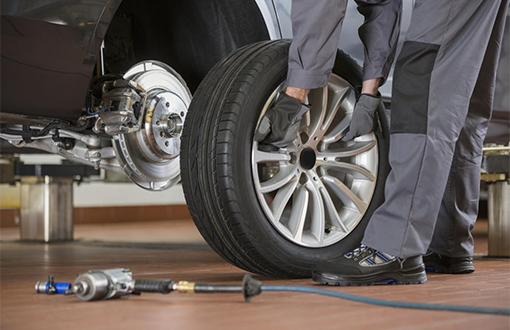No items in cart right now!
Working Hours - 8 AM To 8 PM
 February 12
February 12
Choosing the right tyres for your vehicle is essential for ensuring safety, performance, and driving comfort. With numerous options available, selecting the best tyres can be overwhelming. Factors like vehicle type, driving conditions, and tyre types play a crucial role in making the right decision. This guide will help you understand how to choose the best tyres that meet your specific driving needs and enhance road safety.
Before selecting tyres, it is important to understand the different tyre types available in the market. The type of tyre you need depends on factors such as terrain, weather, and driving style.
Designed for year-round performance in moderate climates.
Provide a balance of grip, durability, and fuel efficiency.
Ideal for everyday commuting and general road conditions.
Built for sports cars and high-performance vehicles.
Offer enhanced traction, cornering, and braking capabilities.
Best suited for dry and wet conditions but wear out faster.
Suitable for both on-road and off-road driving.
Feature deeper tread patterns for superior grip on rough surfaces.
Perfect for SUVs and trucks that traverse various terrains.
Designed for snowy and icy roads.
Provide better grip and shorter braking distances in cold conditions.
Made from a special rubber compound that remains flexible in low temperatures.
Allow you to continue driving after a puncture for a limited distance.
Reduce the risk of sudden tyre failure on the road.
Ideal for safety-conscious drivers who do not want to change tyres on the roadside.
Your vehicle type determines the kind of tyres you need.
Sedans & Hatchbacks: All-season or performance tyres work best.
SUVs & Crossovers: All-terrain or highway tyres for comfort and durability.
Trucks & Off-Road Vehicles: Mud-terrain or all-terrain tyres for rugged performance.
The environment and climate where you drive play a key role in tyre selection.
Urban Areas: Opt for fuel-efficient and quiet tyres.
Highway Driving: Choose tyres with enhanced durability and lower rolling resistance.
Rough Terrain: All-terrain or off-road tyres are essential for better traction.
Snow & Rain: Winter or all-weather tyres provide superior safety.
Tyre size is a crucial factor affecting performance. The right size ensures proper handling and fuel efficiency.
Check the sidewall markings (e.g., 205/55R16) to match your vehicle’s specifications.
Consider speed rating and load index for better stability and safety.
A wider tyre improves grip but may impact fuel economy.
Tread Pattern: Affects water dispersion and road grip.
Tread Depth: Deeper treads improve traction and longevity.
Sidewall Strength: Reinforced sidewalls help in rough conditions.
Braking Efficiency: Performance tyres offer shorter stopping distances.
Investing in high-quality tyres ensures long-term benefits. Leading brands like Michelin, Bridgestone, Goodyear, Pirelli, and Continental offer excellent options.
Premium tyres provide enhanced safety and longevity.
Budget tyres may cost less but may require more frequent replacements.
Compare customer reviews and warranty before purchasing.
Proper tyre maintenance extends their lifespan and ensures optimal performance.
Under-inflated tyres reduce fuel efficiency and cause uneven wear.
Over-inflated tyres lead to reduced traction and harsh rides.
Check tyre pressure at least once a month.
Misaligned wheels cause uneven wear and affect handling.
Get wheel alignment checked every 10,000 km or after hitting a pothole.
Proper balancing reduces vibrations and extends tyre life.
Worn-out treads increase braking distances and reduce grip.
Replace tyres when tread depth falls below 2mm.
Use the penny test or tread depth gauge to check wear levels.
Helps in even wear distribution.
Recommended every 8,000 to 10,000 km.
Improves tyre longevity and maintains handling stability.
Excessive load strains tyres, causing premature wear and risk of blowouts.
Follow the manufacturer’s load rating to ensure safety.
Choosing tyres wisely enhances driving safety, performance, and efficiency. Consider factors such as vehicle type, driving conditions, and tyre types before making a purchase. High-quality tyres improve fuel economy, braking efficiency, and overall road safety. At Etarat Online, we offer a wide range of premium tyres from top brands to suit every driving need.
Browse our collection today and find the perfect tyres for your vehicle!
1. Which is the best tyre brand for performance cars?
Pirelli and Michelin offer high-performance tyres designed for sports and luxury cars.
2. What tyre brand is best for all-season driving?
Goodyear and Bridgestone provide excellent all-season tyre options.
3. How often should I replace my tyres?
It depends on the tread wear, but generally, tyres should be replaced every 40,000–60,000 km or if the tread depth falls below 2mm.
4. Are Michelin tyres worth the price?
Yes, Michelin tyres are known for their durability, fuel efficiency, and high performance, making them a great investment.
5. Can I buy tyres online at Etarat Online?
Yes! Etarat Online offers a wide selection of premium tyres from top brands, available for easy online purchase.
leave a comment